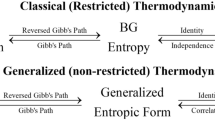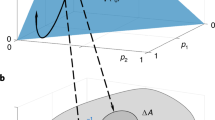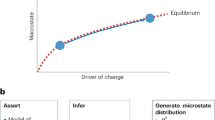Abstract
IT is widely realised that there is no single and uniquely correct statement of the Second Law of Thermodynamics but rather that there exist a number of different and mutually compatible, correct statements1 (Everett2 mentions “two or three dozen”) each of which illuminates a different facet of what H. A. Bent (private communication) has called the “Second Law type of behaviour observed in nature”. There is no brief statement from which “… all of the thermodynamic relationships …”3 can be deduced without further knowledge. In considering a particular problem one particular statement is generally more apposite than another, and for those who are concerned with the mechanisms that produce work, a statement of the Law that stresses the significance of work has distinct advantages. One such statement of mine4 has been criticised by Legon3. Unfortunately the revised article containing the basis for some of my statements has only recently appeared5 though it was submitted long before the other4. This paper5 should have forestalled many of Legon's objections. For example, its first page deals with the question of “maximum work” and its equations (5) to (7) and (9) to (13) deal with equilibria and with entropy creation respectively.
This is a preview of subscription content, access via your institution
Access options
Subscribe to this journal
Receive 51 print issues and online access
$199.00 per year
only $3.90 per issue
Buy this article
- Purchase on Springer Link
- Instant access to full article PDF
Prices may be subject to local taxes which are calculated during checkout
Similar content being viewed by others
References
Bridgman, P. W., The Nature of Thermodynamics, 116 (Harvard University Press, Cambridge, Massachusetts, 1943).
Everett, D. H., Chemical Thermodynamics, 216 (Longman, London, 1971).
Legon, A. C., Nature, 244, 431 (1973).
Wilkie, D. R., Nature, 242, 606 (1973).
Wilkie, D. R., Nature, 245, 457 (1973).
Butler, J. A. V., Chemical Thermodynamics, fourth ed. (Macmillan, 1955).
Carnot, S., Reflections on the motive power of fire (1824), translation (Dover, New York, 1960).
Planck, M., Treatise on Thermodynamics, third ed., trans. from seventh German ed., 1922 (Dover, New York, 1958).
Joule, J. P., Phil. Mag., Series 4, 5, 1 (1853).
Maxwell, J. C., Theory of Heat, fifth ed., chapter XII (Longmans Green, London, 1877).
Thomson, W., Phil. Mag., Series 4, 5, 102 (1853).
Guggenheim, E. A., Thermodynamics, third ed. (North Holland, Amsterdam, 1957).
Keenan, J. H., and Hatsopoulos, G. N., Principles of General Thermodynamics (Wiley, New York, 1965).
Gouy, M., J. de Phys., 2e serie, t. VIII (Novembre 1889).
Thomson, W., Phil. Mag., Series 4, 4, 304 (1852); corrections in ibid, 5, viii.
Author information
Authors and Affiliations
Rights and permissions
About this article
Cite this article
WILKIE, D. Second Law of Thermodynamics. Nature 251, 601–602 (1974). https://doi.org/10.1038/251601a0
Received:
Revised:
Issue Date:
DOI: https://doi.org/10.1038/251601a0
Comments
By submitting a comment you agree to abide by our Terms and Community Guidelines. If you find something abusive or that does not comply with our terms or guidelines please flag it as inappropriate.



